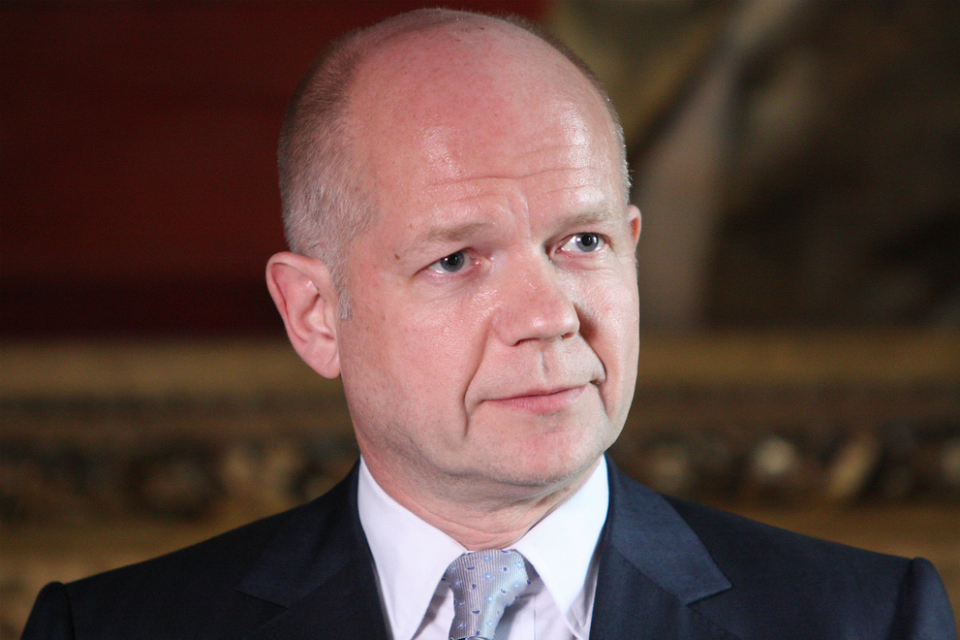Statement on the Historical Role of UK Companies in Supplying Dual Use Chemicals to Syria
Foreign Secretary William Hague updated Parliament on the historical role of UK Companies in supplying dual use chemicals to Syria

The Secretary of State for Foreign and Commonwealth Affairs (William Hague):
Following Syria’s accession to the Chemical Weapons Convention (CWC) last year, and as part of the process to eliminate its chemical weapons (CW) programme, Syria provided a confidential declaration to the Organisation for the Prohibition of Chemical Weapons (OPCW) which lists a number of states from which it obtained supplies of goods used in its CW programme.
The information in Syria’s declaration is classified under the terms of the CWC. However, I wish to inform the House that a review of our own files suggests that there were a number of exports of chemicals to Syria by UK companies between 1983 and 1986 which were likely to have been diverted for use in the Syrian programme.
These exports were:
- several hundred tonnes of the chemical dimethyl phosphite (DMP) in 1983 and a further export of several hundred tonnes in 1985;
- several hundred tonnes of trimethyl phosphite (TMP) in 1986; *a smaller quantity of hydrogen fluoride (HF) in 1986 through a third country.
All these chemicals have legitimate uses, for example in the manufacture of plastics and pharmaceuticals. However, they can also be used in the production of sarin. DMP and TMP can also be used for the production of the nerve agent VX. That is why the export of such goods is strictly prohibited under the UK export regime introduced since the 1980s and progressively strengthened.
From the information we hold, we judge it likely that these chemical exports by UK companies were subsequently used by Syria in their programmes to produce nerve agents, including sarin.
Some of the companies involved no longer exist. Furthermore, some of the chemicals in question may have been sourced by a UK chemical trader, rather than produced in the UK.
The review of our records also confirmed an export of ventilation fans by a UK company to Syria in 2003. The fans were not controlled goods.
Following an enquiry by the exporter, officials considered the export under licensing procedures, and insufficient grounds for refusal were found. Syria appears to have diverted these fans for use in a chemical weapons facility.
In the early 1980s, the exported chemicals were not subject to any international or UK export controls. However, knowledge of these exports, and growing concerns that Iraq under Saddam Hussein was developing a chemical weapons capability, helped prompt the introduction of tighter controls, both in the UK and internationally.
The Export of Goods (Control) Order was amended to control DMP in July 1985, and TMP and HF in June 1986.
There has been a complete overhaul of export control legislation, policy and practice since the 1980s, designed to ensure that such exports could not happen today. The UK operates a robust export control regime, and takes international obligations on this issue very seriously.
Key instruments and legislation include:
-
The Chemical Weapons Convention. The Chemical Weapons Act 1996 implements the provisions of the Convention which imposes specific controls on the transfer of certain chemicals including DMP and TMP.
-
The development of the Australia Group, of which the UK was an original member in 1985. As a matter of routine, all changes to the Australia Group control lists are reflected in UK national export controls. It controls trade in HF as well as DMP and TMP.
-
The Export Control Act 2002. Replacing legislation passed in 1939, the current legislation provides for controls on the export and brokering of listed goods and technologies, in addition to controls on unlisted items where it is believed they may be intended for use in weapons of mass destruction programmes.
Furthermore, the EU has developed EU wide controls on the export of dual use goods, including chemicals. Our ability to control exports is underpinned by the Consolidated EU and National Arms Export Licensing Criteria, adopted by the UK in 2000 and updated in March 2014. The Criteria set a clear basis for the assessment of export licences. This is undertaken on a case by case basis taking account of all available information.
Today, the UK is playing its full part in the international effort to eliminate Syria’s programme. As the House is already aware, the UK is accepting 150 tonnes of B precursors from the Syrian chemical stockpile for destruction. I can today also inform the House that in addition to those chemicals, a further 50 tonnes of the industrial chemicals hydrogen chloride and hydrogen fluoride will also be destroyed in specialised commercial facilities in the UK. We expect the ship transporting all these chemicals to arrive in the UK next week. The Members of Parliament in whose constituencies destruction will take place have been informed.